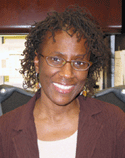Poor health in adulthood linked with parents' education level

Sandra Moody-Ayers, MD
The level of education of one’s parents is a key predictor of adult health status among members of the white and African-American communities, according to a study of more than 20 thousand adults aged 50 and older conducted by researchers at the San Francisco VA Medical Center (SFVAMC).
Participants whose parents had less than an eighth grade education were significantly more likely to have poor or fair health in adulthood than participants whose parents had more education, according to the study authors.
“It’s long been observed that lower socioeconomic status in childhood predicts poor health in adulthood, but this is the first study to isolate parents’ level of education as a critical predictive factor,” says lead author Sandra Moody-Ayers, MD, a staff physician and geriatrician at SFVAMC and an associate professor of medicine at the University of California, San Francisco (UCSF).
The effect of parents’ education level was observed but much weaker in Latino participants, notes Moody.
The study is available in the online Advance Access section of the American Journal of Epidemiology:
http://aje.oxfordjournals.org/papbyrecent.dtl .
The authors studied 20,566 adults aged 50 and older who are participants in the Health and Retirement Study, an ongoing national prospective study sponsored by the National Institute on Aging that is examining the relationship between health, income, and wealth over time. Participants were asked to report their childhood socioeconomic status based on three measures: whether their
families were poor or not poor; whether their families had to move as a result of financial hardship; and number of years of education completed by each parent. They were also asked to rate their own health status; the authors note that self-rated health status is strongly predictive of morbidity and mortality.
After controlling for variables including age, gender, race and ethnicity (white, African-American, and Latino), and current socioeconomic status, the researchers found that an important predictor of adult health status was parents’ educational level. This predictive effect was most pronounced through mid-life and fell off somewhat in old age.
“This goes a long way toward explaining the long-observed disparity in health outcomes between whites and non-whites in America,” says Moody.
“Lifelong economic hardship, such as occurs disproportionately among African-Americans, has a cumulative effect—at
least until the health problems commonly associated with old age begin to dominate.”
The effect of parental education was statistically significant in white and African-American participants and observed but much weaker in Latino participants, notes Moody. The authors do not account for this difference but speculate that it may be related to the so-called
“Hispanic or Latino Paradox”: Mexican-Americans, who make up the predominant Latino group in the current study, have been shown in previous studies to have better health status compared with white and other ethnic Americans of the same socioeconomic status when they maintain strong social and familial ties to their communities.
“It’s also possible that the number of Latinos in the study was not high enough to have statistical power,” Moody speculates. “But it’s suggestive nonetheless.”
Coauthors of the study were Karla Lindquist, MS, of UCSF, and Saunak Sen, PhD, and Kenneth E. Covinsky, MD, MPH, of SFVAMC and UCSF.
The research was supported by funds from the Department of Veterans Affairs, the National Institute on Aging, and the National Institute on Nursing Research.
SFVAMC has the largest medical research program in the national VA system, with more than 200 research scientists, all of whom are faculty members at UCSF.
UCSF is a leading university that advances health worldwide by conducting advanced biomedical research, educating graduate students in the life sciences and health professions, and providing complex patient care.